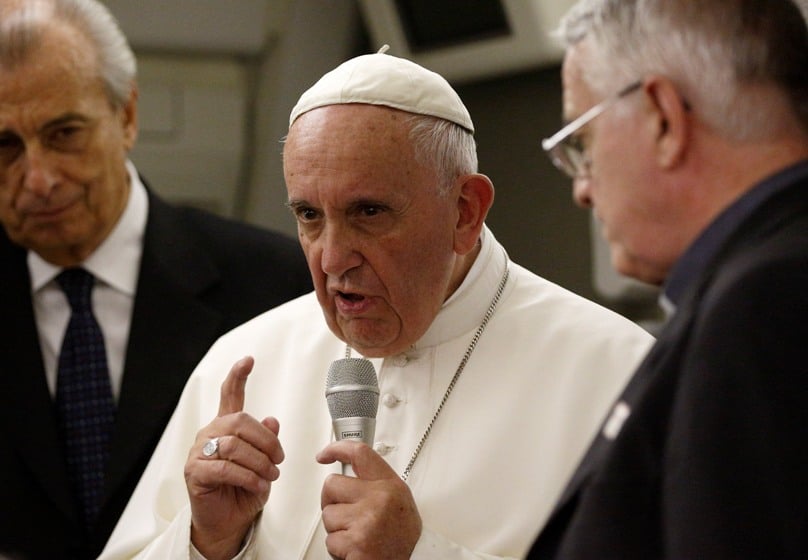
There was a great extract from Pope Francis’ customary Q&A session on his flight from Cuba to the United States last week.
A reporter from Italian newspaper Corriere della Sera spoke about the pope’s denouncement of the inequity of the world’s economic system, environmental issues and arms trafficking, and asked: “There have already been discussions about a communist pope, now there are even those who speak of a pope who isn’t Catholic. In the face of these considerations, what do you think?”
The pope responded by retelling a story of a cardinal friend of his had told him a Catholic woman had approached him, convinced that Pope Francis was the anti-pope. It was obviously not the first time he had heard such things.
The pope conceded that it is possible in explaining things, he has given the impression that he leans “a little to the left”, but said that would be an error of explanation. He answered that his doctrine is the social doctrine of the Church, and offered to recite the Creed if necessary to allay concerns.
A couple of years ago, an exchange like this with the pope would have been unthinkable: a reporter raising concerns about the pope’s Catholicity with him, and a pope so familiar with the accusation that he responds with a personal anecdote, as retold to him by a cardinal.
But in the story of Pope Francis, it doesn’t seem unthinkable or even unlikely.
The reporter was merely articulating what has been written and spoken about so many times in the weeks prior to Pope Francis’ visit to the United States, and also in the lead up to the Synod on the Family, which begins this week.
Countless stories have been written suggesting Pope Francis is on the cusp of changing unchangeable Church teachings, that he prioritises trees over human life, or that his economic policy is thinly-veiled Communism. New accusations appear almost daily.
These alarmist stories are somewhat par for the papacy, but they used to be a lot easier to dismiss.
Remember when headlines suggested that Pope Benedict XVI had approved the use of condoms in certain circumstances? The headlines were met with a celebratory whoop among those who have long sought for a change to this teaching, from both within and outside of the Church.
But almost immediately, an army of Catholic commentators corrected the story. They explained that Pope Benedict had used the example of a male prostitute using a condom, and commented that this could indicate an intention to reduce HIV infection, which was a step towards living sexuality in a more human and more moral way. This was not the same as an approval of condom use, and a calm, steady voice was able to articulate this well.
The same does not seem to be happening for Pope Francis.
More often than not, the Holy Father will say something, and those who wish to see a change in Church teaching, particularly on grave moral issues, will leap on it as an example of imminent and dramatic change.
And instead of there being a chorus of calm, steady voices inviting people to take the pope’s words in context and assuring them that Church teaching is not changing, there is a group rending their garments and exclaiming: “You’re right! The Holy Father is about to change everything!”
The calm, steady voice has disappeared, or it is at least being drowned out by those who, like the woman in the pope’s anecdote, view Pope Francis as the anti-pope.
Yes, Pope Francis’ colloquialisms and off-the-cuff remarks lend themself to misinterpretation. Maybe there would be less confusion if he stuck closely to prepared text which had been read and polished by others before delivery. Maybe his words wouldn’t be so often taken out of context if he behaved more like a politician when it came to making public comments.
But regardless of what people may think of the pope’s personal style, there is a need to restore that calm, steady voice.
The Synod on the Family begins on 4 October, and if it is anything like last year’s Synod, there will be headline after headline announcing any number of changes in Church teaching.
People both inside and outside the Church, present at the Synod and not, will pounce upon information or quasi-information to advance a particular point of view. We can’t control the bad behaviour of others and we will make ourselves crazy if we try.
But we can control how we react.
We can join the hysteria, repeat outrageous stories without checking and contribute to it, or any other number of things which risk scandalising others.
Or we can seek reliable information and context, and be one of the much-needed calm, steady voices (or at least to ensure that we are not misled ourselves).
Fortunately, The CW is making it easy to get the best information. Each day, on its website and through its various social media platforms, this paper will provide coverage of the Synod events.
I look forward to following this very important time in the life of our Church with you.
